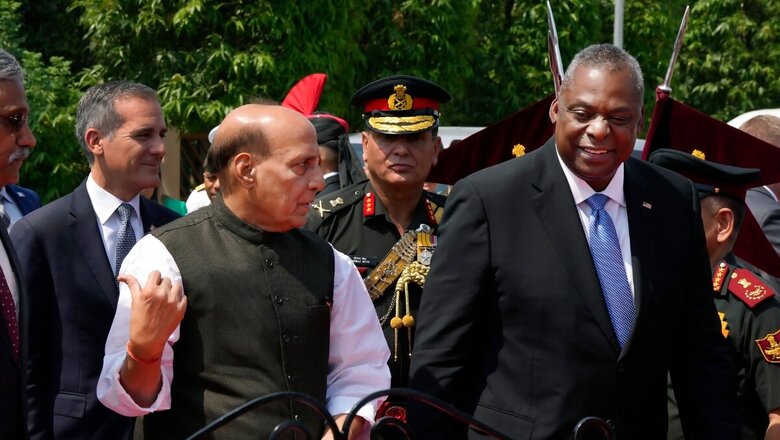
views
Defence Minister Rajnath Singh on Monday met US American counterpart Lloyd Austin who arrived in India on Sunday, on a two-day tour that comes over two weeks ahead of Prime Minister Narendra Modi’s state visit to Washington. At the meeting, Rajnath Singh and Austin are believed to have discussed various key aspects of India-US defence ties and the regional security scenario, including in the Indo-Pacific.
Ahead of the talks, officials familiar with Austin’s visit had said his discussions with Singh would focus on a number of significant areas of cooperation, including transfer of critical technologies for co-development of military hardware.
Austin is scheduled to meet National Security Advisor Ajit Doval as well on Monday and their meeting is likely to focus on security issues, including Russia and Ukraine. This is Secretary Austin’s second visit to India. His previous trip to India was in March, 2021.
Austin’s visit is crucial in view of General Electric’s proposal to share technology with India for fighter jet engines and New Delhi’s plan to procure 30 MQ-9B armed drones at a cost of over $3 billion from US defence major General Atomics Aeronautical Systems Inc besides other issues.
India has been looking for manufacture of jet engines in the country under the framework of technology transfer to power its fighter aircraft.
In June 2016, the US designated India a “Major Defence Partner” paving way for sharing of critical military equipment and technology.
In a major move, President Joe Biden and Prime Minister Modi announced in May last year the US-India initiative on Critical and Emerging Technology (iCET) to elevate and expand the strategic technology partnership and defence industrial cooperation between the two countries.
The iCET is expected to forge closer linkages between the government, academia and industry of the two countries in areas such as artificial intelligence, quantum computing, 5G and 6G, biotech, space and semiconductors.




















Comments
0 comment